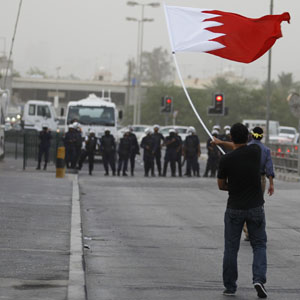
I’ve been in hiding for the past two years. The Bahraini government imprisoned me from August 2010 to February 2011, and it was obvious I would be rearrested; so I went underground. It’s not easy – I’m married with a 10-year-old son, and the risk of capture is always there – but I carry on, participating in the struggle for human rights and democracy in my country from my hiding place.
In February 2011, the same month I was released from prison, thousands of Bahrainis rose up to demand their rights. The monarchy responded with violence and repression, firing at peaceful protesters, arresting and jailing countless activists.
 I am associated with a committee against torture, an issue I know well as I myself was tortured in prison. The government has used torture routinely. Many people have died in custody.
I am associated with a committee against torture, an issue I know well as I myself was tortured in prison. The government has used torture routinely. Many people have died in custody.
In a military court in May 2011, I was convicted in absentia for allegedly trying to overthrow the government and sentenced to 15 years in prison, a sentence later confirmed by a civilian court. Twenty other leading activists were convicted along with me. The group includes Abdulhadi al Khawaja, Hassan Mushaima, Ibrahim Sharif, Abdul Wahab Hussain and others. Thirteen of them are in prison not far from where I am hiding.
“We are a small country and not many have taken note of our struggle… [b]ut having taken to the streets, we’ve tasted a bit of freedom and we’re not going back.” – Bahraini activist Abdul Ghani Al Khanjar
The protests continue; they’ve never stopped. Every night I hear them outside with the police attacking people with tear gas, rubber bullets, and stun grenades. Two years have now passed since the protests began and reform still remains distant. The ruling family still controls the country. We have the world’s longest-serving prime minister; he’s had the job for 41 years and has never been elected. He’s the king’s uncle.

A protester shouts slogans at an anti-government rally in downtown Manama September 7, 2012. (Reuters)
The lack of condemnation or action from influential international players is glaring. Believe me, people here have noticed. Although human rights groups have pressed our case with the U.S. government, we’ve seen double standards from the Obama Administration, which has aggressively condemned crackdowns against peaceful protesters in other Middle Eastern countries. The United States has a military base here and often says publicly that Bahrain remains an important military ally.
Last week, on February 14, we marked the second anniversary of our uprising. The King of Bahrain recently kicked off another round of empty “dialogue” with us. We had one of those in July 2011, and it was just a sideshow. What’s needed is for the attacks by the police to stop, the political trials to end, and for those opposition leaders and activists convicted with me and more than 1,000 other political detainees to be released.
The senior members of the government who are responsible for ordering or condoning torture must be brought to justice – this is something the U.S. and other countries should be demanding clearly and loudly. It’s hard to imagine real political negotiations while the abuses continue.

A anti-government protester waves a Bahraini flag as he confronts riot-police in Bilad al-Qadeem west of Manama, June 2, 2012. (Reuters)
I don’t know how much longer I’ll remain in hiding. It’s a strange feeling to be stuck in a room for two years, not being able to feel the sun shine or get some fresh air, not being able to move more than few feet from wall to wall, but the political situation will hardly change anytime soon. Peaceful protesters are losing confidence that the international community really cares about their plight.
We are a small country and not many have taken note of our struggle. For some, we’re the inconvenient uprising. But having taken to the streets, we’ve tasted a bit of freedom and we’re not going back. In the streets, in the courts, even in hiding, we will make this revolution happen.
Middle East Voices received this post through Human Rights First.
The views expressed in this Voices post are the author’s own and are not endorsed by Middle East Voices or Voice of America. If you have an opinion on this post, you may use our democratic commenting system below. And, if you would like to share your own reflections on events or issues about or relevant to the Middle East, we would be glad to consider them for publication. Please email us through our Contact page with a short proposal for a Voices post or send us a link to an existing post already published on your personal blog.
Abdul Ghani Al Khanjar
Abdul Ghani Al Khanjar is a Bahraini human rights activist associated with a national anti-torture committee banned by the kingdom’s government. He has reportedly been living in hiding in Bahrain since February 2011.
Pingback: Arab News Blog » Bahrain’s Agony Continues 2 Years Later
Pingback: Bahrain's Agony Continues 2 Years Later | Informed Comment
Pingback: News: 22-Feb-13 | Serat Online